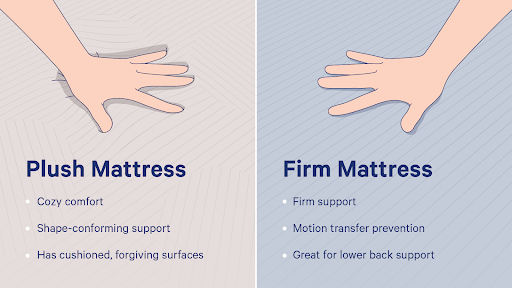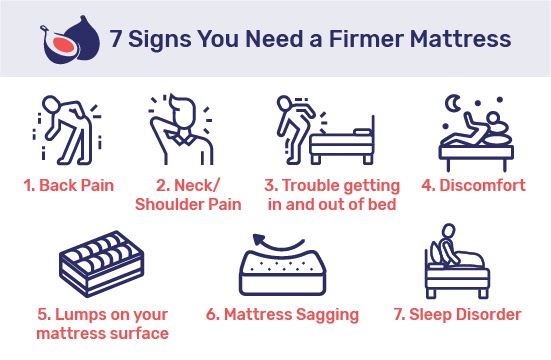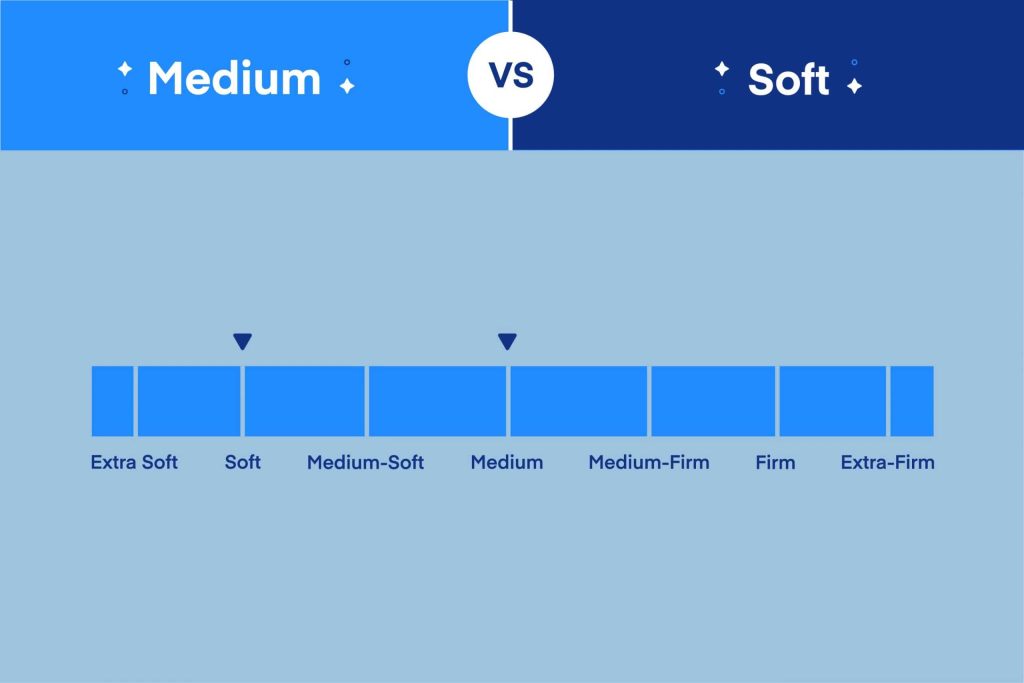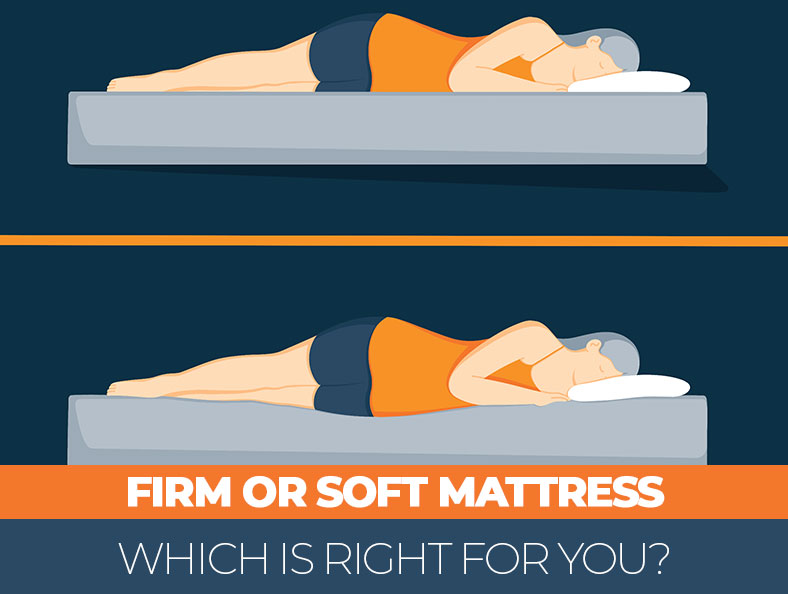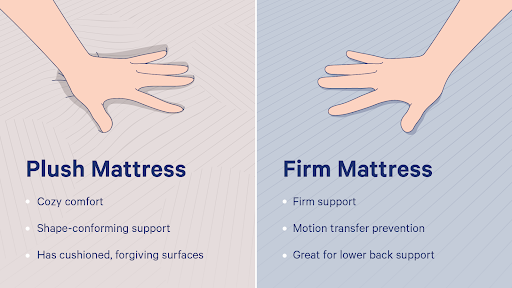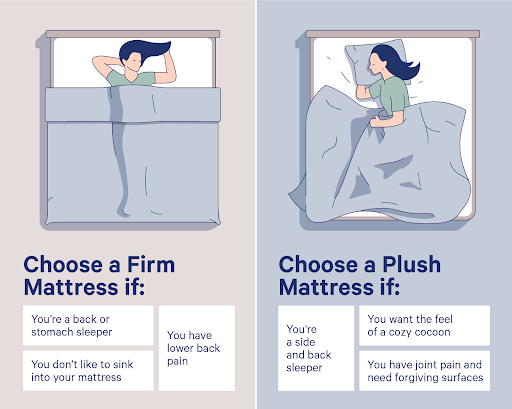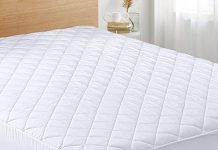Choosing the right mattress can make a world of difference in the quality of your sleep. But with so many options available, how do you know whether to go for a firm or soft mattress?
Finding the perfect balance between support and comfort is essential for a good night’s rest.
In this article, we’ll explore the benefits of both firm and soft mattresses, helping you determine which one is best suited for your individual needs.
So, whether you prefer a sturdy and supportive sleep surface or a plush and cozy one, we’ve got you covered!
Review contents
Overview of Mattress Firmness
Definition of Mattress Firmness
One crucial factor to consider when choosing a mattress is its firmness level. Mattress firmness refers to the feel or hardness of the mattress surface. It determines whether the mattress is soft or firm when lying on it. Firmness is typically measured on a scale from 1 to 10, with 1 being incredibly soft and ten extremely firm.
Importance of Mattress Firmness
The firmness of your mattress plays a crucial role in how well you sleep and how comfortable you feel throughout the night. It can affect your spinal alignment, pressure points, and overall level of support. Finding the right level of firmness is essential to promote a healthy and restful sleep experience.
Factors to Consider
Sleeping Position
Your preferred sleeping position is vital in determining the ideal firmness level for your mattress. Different sleeping positions require different levels of support. For example, side sleepers generally benefit from a softer mattress that cushions the curves of their body. In contrast, back and stomach sleepers often need a firmer surface to align their spine.
Body Weight
Body weight is another crucial factor to consider when deciding on mattress firmness. Heavier individuals may require a firmer mattress to provide adequate support and prevent sinking too deeply into the bed. On the other hand, lighter individuals may find a softer mattress more comfortable due to less pressure being placed on the surface.
Medical Conditions
If you have any medical conditions such as chronic pain or arthritis, the right mattress firmness can significantly affect your comfort and overall well-being. Individuals with back pain or joint issues may benefit from a medium-firm to firm mattress that provides proper support and alignment. It is advisable to consult with your healthcare professional for personalized recommendations based on your specific condition.
Personal Preferences
Ultimately, your personal preferences should guide your choice of mattress firmness. Some people prefer a softer or firmer feel based on their subjective comfort. Considering your sleeping habits, body type, and personal preferences will help you find the perfect balance between comfort and support.
Motion Isolation
Another factor to consider is motion isolation. If you share your bed with a partner, a mattress with sound motion isolation can minimize disturbances caused by movement during the night. Firm mattresses tend to have better motion isolation than softer ones, which can be beneficial in reducing sleep disruptions.
Advantages of Firm Mattresses
Spinal Alignment
One of the critical advantages of firm mattresses is their ability to promote proper spinal alignment. A firm mattress provides enough support to keep your spine in a neutral position, aligning your body’s natural curves. This can help alleviate back pain and reduce the risk of developing posture-related issues over time.
Support for Heavier Individuals
Firm mattresses are often recommended for individuals who are on the heavier side. These mattresses offer better support and prevent excessive sinking, creating a more comfortable and supportive sleep surface. If you weigh more than average, a firm mattress can provide the support your body needs to maintain proper alignment and minimize pressure points.
Prevention of Sagging
Firm mattresses tend to be more resistant to sagging over time. Their extra support helps distribute your body weight evenly across the mattress, reducing the risk of permanent imprints or depressions. This can increase the mattress’s lifespan and ensure long-term comfort and durability.
Disadvantages of Firm Mattresses
Pressure Points
While firm mattresses excel in providing support, they may not be as effective in relieving pressure points. Due to their lack of cushioning, firm mattresses can create discomfort around sensitive areas such as the hips, shoulders, and knees. This can lead to increased tossing and turning throughout the night, potentially disrupting sleep.
Lack of Cushioning
Some individuals prefer the feeling of sinking into a plush, cushioned mattress. Firm mattresses, by nature, lack that initial softness and may feel too hard for those seeking a more cozy and gentle sleeping surface. The absence of cushioning can also reduce comfort for individuals with arthritis or fibromyalgia.
Limited Comfort Options
Another potential drawback of firm mattresses is the limited comfort options available. While there may be a range of firmness levels within the firm category, it may not provide the same variety of options as softer mattresses. This can make it challenging to find the perfect balance of firmness and comfort tailored to your needs.
Advantages of Soft Mattresses
Pressure Relief
Soft mattresses are known for their ability to provide excellent pressure relief. The gentle surface conforms to your body’s natural shape, cradling areas prone to pressure points. This can alleviate discomfort and promote better circulation, allowing you to sleep more comfortably and wake up with reduced soreness.
Conformity to Body Shape
Soft mattresses offer superior contouring and conformity to your body’s shape. They provide a hugging sensation that helps evenly distribute your weight across the surface. This can be particularly beneficial for individuals with joint pain or conditions such as fibromyalgia, as it can minimize the impact on tender areas and promote pain-free sleep.
Suitable for Lighter Individuals
Soft mattresses can provide the right level of support and comfort for individuals who weigh less. Since lighter individuals exert less pressure on the mattress, they may not require the same level of firmness as heavier individuals. A softer mattress can cater to their needs, offering a cozy and inviting sleep experience.
Disadvantages of Soft Mattresses
Lack of Support
Soft mattresses may lack support for specific individuals, especially those with back or joint issues. The plush surface can cause excessive sinking, compromising spinal alignment and potentially exacerbating pain. Finding the right balance between softness and support is essential to ensure proper alignment and minimize discomfort.
Sagging
Soft mattresses have a higher risk of sagging and losing their shape over time. The lack of firmness can result in a greater tendency for the mattress to develop permanent imprints or depressions. This can reduce the overall lifespan of the mattress and compromise its ability to provide adequate support over the years.
Limited Durability
Due to their construction and materials, soft mattresses may have a shorter lifespan than firmer options. Over time, the increased wear and tear can lead to decreased support and comfort. If durability is a significant factor, it may be worth considering a firmer mattress that typically lasts longer and maintains its shape better.
Common Misconceptions
Firm Mattresses are Always Better for Back Pain
While firm mattresses can provide excellent support and spinal alignment for some individuals with back pain, they are not universally better for everyone. Everyone has unique needs, and some may find that a softer mattress relieves their back pain. It is essential to consider personal preferences and consult with a healthcare professional to determine the best mattress firmness for your specific situation.
Soft Mattresses are Always More Comfortable
While soft mattresses can provide a cozy and plush sleeping surface that many people find comfortable, this is not always the case. Comfort is subjective and varies from person to person. Some individuals may find that a firmer mattress provides the proper support and comfort for their needs. It is crucial to try different options and consider factors such as sleeping position and body weight when determining the most comfortable mattress.
Finding the Right Balance
Hybrid Mattresses
If you struggle to choose between firm and soft mattresses, hybrid mattresses can offer the best of both worlds. These mattresses combine the support of an innerspring or pocket coil system with the cushioning comfort of foam or latex layers. Hybrid mattresses can balance firmness and softness, offering support where you need it while providing pressure relief and comfort.
Adjustable Firmness Mattresses
For ultimate customization and flexibility, adjustable firmness mattresses may be worth considering. These mattresses allow you to modify the firmness level to suit your preferences or adapt to changing needs. Adjusting different layers or zones allows you to fine-tune the mattress to find the perfect balance of support and comfort.
Testing the Mattress
To ensure you find the right mattress for your needs, testing it out before making a purchase is crucial. Many mattress retailers offer sleep trial periods, allowing you to try the mattress for a certain period, typically 30 to 120 nights. During this time, you can assess the mattress’s firmness, comfort, and overall suitability to determine if it meets your expectations.
Importance of Personal Preference
Sleep Trial Periods
The importance of personal preference cannot be overstated when choosing the right mattress firmness. Sleep trial periods mentioned earlier are invaluable as they allow you to experience the mattress firsthand and ensure it meets your specific needs and comfort preferences.
It takes time for your body to adjust to a new mattress, so ensure the sleep trial period is long enough to give you a comprehensive understanding of its firmness and comfort level.
Consultation with Healthcare Professionals
If you have specific medical conditions or concerns, it is always advisable to consult with healthcare professionals. They can provide valuable insights and recommendations based on your unique needs and medical history.
A healthcare professional, such as a chiropractor or orthopedic specialist, can help you select the right firmness level to support existing conditions and promote better sleep quality.
Conclusion
Choosing the right mattress firmness is a personal decision that should consider factors such as sleeping position, body weight, medical conditions, and personal preferences. While firm mattresses offer excellent spinal alignment and support, soft mattresses relieve pressure and conform to the body’s shape.
Understanding the advantages and disadvantages of each can help you make an informed decision and find the perfect balance between comfort and support for a restful and rejuvenating sleep experience. Consider hybrid or adjustable firmness options and take advantage of sleep trial periods to ensure the mattress meets your requirements.
When in doubt, consulting with healthcare professionals can provide additional guidance for optimal sleep health. Ultimately, the right mattress firmness is the one that allows you to wake up feeling refreshed and ready to take on the day.

